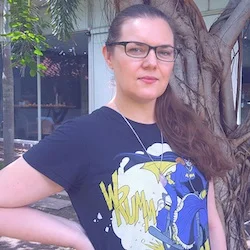A Little Short
yolande house
South Korea, 2017
Like pellets of rain, the touch is soft, gentle. I turn and face the widened eyes of one of my fourth-grade students, a sweet Korean girl with long, black hair, who caresses my upper arm.
“Fat,” she says.
That’s what I get for wearing short sleeves today.
I frown and stick out my lower lip, whimper, and use my index fingers to mime tears running down my cheeks. That hurts my feelings.
Comments like these used to bother me. When students at my first teaching job in South Korea called me “pig,” I’d leave class in tears. Five years later, I’ve lost a lot of weight, going from a North American size 2X to an XL; friends at home say I’m “average” now, but I still feel like a giant. Some Koreans are gaining weight from adopting a Western-style diet full of fried chicken, pizza, and sweet garlic bread, but most remain naturally thin. Even slender Westerners hear, “Teacher! Big!”
Direct observations like this are usually well-intended. In South Korea, where photographs are clipped to résumés and plastic surgery is routine, physical appearance affects job and marriage prospects. But I can’t help my Western stubbornness: my conviction that my body size is no one’s business. My co-workers used to tell me nearly every day, “You look sick,” or, “You look tired.” Each morning as I said hello, I felt the weight of their calculating gaze and my breath caught. Rarely did I pass their judgment. One day I snapped, saying with heat in my voice, “I just look like this,” and they stopped.
Over time I’ve learned what to do when I’m hurt by a student’s remark—I mime my feelings. The Korean girl, delicate as a sparrow, considers my response and then gestures an open hand toward my face, saying, “Pretty.”
Pretty. A broad smile rounds my cheeks. Fat, but pretty. Heh.
Her hand touches my lower arm. She cocks her head to the side, thoughtful, and adds, “Little slim.”
Okay. My lower arm is slim. Great.
“Thank you.” I smile, wave to the girl, and then grab my yellow basket full of papers and notebooks.
When I wear sleeves well above the elbow, many of my co-teachers ask, “Aren’t you cold?” I’ll say, “No, that’s why I took my sweater off.” Over time, I’ve come to realize they’re expressing the Korean notion that you should cover your arms unless it’s summertime. Showing cleavage and shoulders is risqué, but exposed upper arms are acceptable when it’s hot and muggy.
Except for the incident with an adjushi. I was lying on a park bench in a tank top enjoying some sun when the older man rushed over, shaking his head, speaking in rapid-fire Korean. He motioned frantically around his shoulders, over and over until I sat up and put my cardigan back on. Only then did he nod and leave. “I don’t miss that,” said my now-stateside American friend when I told her the story.
Westerners in Korea can find this conservatism ironic, considering liberal attitudes here toward bared legs. A popular expat cartoon shows two women passing each other in the street and glaring—the Korean looking at the American’s exposed cleavage, the American looking at the Korean’s barely-there skirt.
When I first arrived, I realized most of my Canadian clothes were wrong. My sneakers and buckled Mary Janes were inconvenient for the restaurants where you sit on a floor cushion, cross-legged, in front of a shallow table, or at my public school where we change into slippers. My short-sleeved tops needed to be layered with their long-sleeved cousins in the colder months when there is little to no indoor heating in bathrooms and many establishments. I had to purchase multiple winter jackets, since the schools can be so cold that students and teachers don outerwear inside, rarely unzipping in the coldest months.
In the sticky heat of summer, I try to wear cardigans that reach the elbow. There’s always a student who will comment or caress if I forget.
Over time, I’ve come to accept that I will never fit into Korean beauty standards of a super-slim frame and a small, V-shaped face. I’m tall and big-boned; I could lose all my weight but still be considered “fat” here. In Canada, I learned to live with the usually quiet but ever-present scrutiny of appearance, my gaze catching my reflection, and heart either sinking or lifting. Once I worked on accepting and loving my body—at home and abroad—it was easier to nod and smile, and say a gracious, “Thank you!” to a well-meaning child.
One day, a boy in class squeezes my forearm, rubbing his hand along its surface. I eye him warily, brace myself for the insult. Too thick? Too hairy?
He looks up from his seat, eyes bright, voice filled with wonder, and says, “Strong!”
Oh! That’s a first. I flex my arms. To me, strong means healthy, capable. “Yeah! I’m strong!”
He laughs.
I practically skip to the front of the class.


